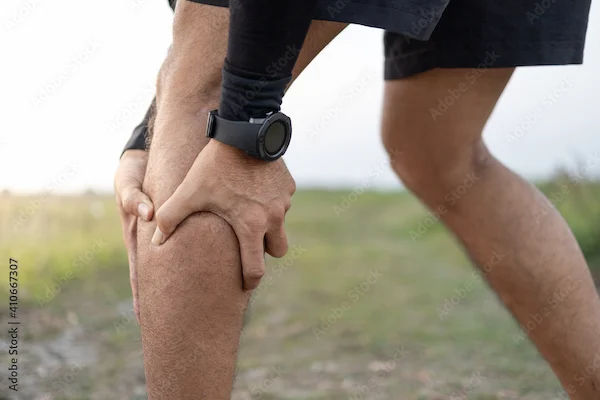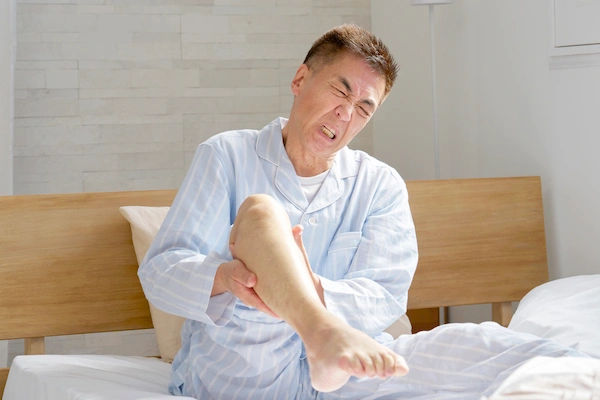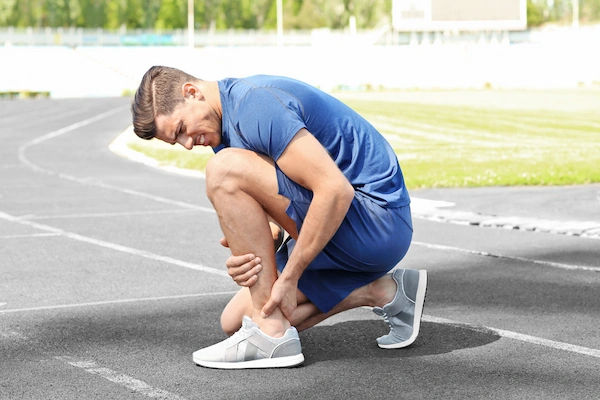How To Reduce Muscle Soreness?
Discover proven strategies and remedies to relieve muscle soreness after workouts. Learn the best techniques to speed up recovery and feel better faster.

Written by
Last updated on 13th Jan, 2026
Muscle soreness is a common condition where a person feels pain and discomfort in their muscles after a physical activity, generally heavy workouts. It can also happen due to poor posture, overuse of muscles, and not warming up or stretching out properly before or after exercise. According to the American College of Sports Medicine, it is a sign that the muscle tissue is damaged. When this happens, the body automatically starts a repair process by triggering inflammation in the area of injury, resulting in muscle pain. Further exercise exacerbates the condition. Though this is harmless, severe long-term soreness is hazardous to health. Thus, people must understand the correct treatment procedure and strategies to address this issue.
Types of Muscle Soreness
There are two different types of muscle soreness.
Acute muscle soreness:
Acute muscle soreness occurs right after exercise. Thus, it is also known as immediate muscle soreness. During high-intensity exercises, metabolites build up in the body, causing muscle soreness. However, this type of soreness is quickly curable.
Delayed Onset Muscle Soreness (DOMS):
This type of muscle pain and discomfort occurs 12-24 hours after a high-intensity exercise. The symptoms appear between 24 and 72 hours. Their severity depends upon the duration and intensity of the exercise. DOMS is associated with an extended eccentric muscle contraction that affects multiple limbs. Also, it damages the connective tissue elements of the muscle and results in the accumulation of interstitial fluid and disruption of myofibrils. All these elements undergo repair in the next 7 days.
Prevention Strategies
Proper prevention strategies can effectively manage muscle soreness. These are -
Gradual increment in exercise intensity may minimise muscle soreness after exercise. It also reduces muscle strain.
A person must go through a warm-up session before the exercise for physical and mental health. These empower a range of motion by activating the connections between the muscles and nerves.
Cooling down after exercise is another essential aspect. So, dynamic or static stretching should be practised. It will help to promote a sense of calmness.
Adequate hydration plays a vital role in muscle recovery and strength. It is mandatory to drink water after exercise. Also, taking moderate doses of caffeine may help recover from the post-workout pain by 50%. Thus, people can drink a cup of coffee before the workout.
Not only is hydration enough for removing muscle soreness, but proper nutrients are also needed. Macronutrients are the group of nutrients that promote post-workout recovery. These include protein, fat and carbohydrates. So, eating milk, eggs, fish, chicken, and starchy vegetables will be helpful.
Home Remedies for Muscle Soreness
If you're dealing with muscle soreness, try these natural and effective home remedies to alleviate discomfort and speed up your recovery.
Rest and Recovery: Taking a day off can enhance energy and repair the body. Sports experts and coaches suggest that the day following a heavy workout session, individuals must perform some light exercise. It will help the muscles to recover. Also, sleeping for at least 8 hours is mandatory as the body recovers during sleep.
Applying Ice: Applying 20-30 minutes of ice can reduce blood flow within the sore muscles. It further lessens the pain and swelling. However, an extensive cold can cause muscle inflammation. Thus, putting a towel between the skin and the ice is recommended.
Heat Therapy: Heat therapy is the best form of treatment if muscle soreness does not reduce after 48 hours of exercise. It triggers the blood flow within the muscles, reducing their tightness. As a result, the muscles become more flexible. So, it is wise to use a heating pad or warm towel with proper guidance so that the skin does not get burnt.
Stretching Exercises: A simple stretching routine helps to reduce muscle soreness and tightness. However, before starting any stretch, it is wise to consult a physical therapist or healthcare provider.
Professional Treatments
In case of severe muscle soreness, individuals may require professional treatment. These include physical therapy, body massage and over-the-counter medication.
The therapist treats the patient with numerous exercises during a physical therapy session. It helps recover the weakened or stiff muscles of the body. Some common exercises include low-impact aerobics training, strengthening and pain relief activities.
Applying light body massage can relieve muscle tension and increase blood flow. These massages can not only improve joint motions but also improve mood. Otherwise, tender-point acupressure can be applied to the sore muscles for recovery.
Using over-the-counter medications can soothe muscle pain and reduce swelling. So, one can try non-steroidal anti-inflammatory drugs (NSAIDs) such as ibuprofen, naproxen, or aspirin.
Role of Diet in Muscle Recovery
Exercise causes the breakdown of muscle protein. The breaking rate depends upon the training frequency, volume and intensity. Thus, consuming sufficient protein will provide the amino acids to the body, which help to repair and build new muscle tissue. The International Society of Sports Nutrition (ISSN) suggests eating 20-40 grams of protein every 3-4 hours will improve muscle recovery and body composition, thus contributing to exercise performance. Hence, it's essential to consume protein before and after workout sessions. The ISSN also recommends eating high-quality proteins within 2 hours after the workout, which will activate the building of new muscle tissue.
Some medical evidence suggests that anti-inflammatory and antioxidant-rich foods can reduce muscle soreness. Also, some studies show that the amino acid called L-citrulline in watermelon lessens muscle soreness and recovers heart rate. Moreover, other anti-inflammatory foods such as ginger, cherry juice and pineapple are beneficial for treating muscle soreness.
Exercises to Alleviate Muscle Soreness
Several activities help people recover muscles faster. However, the robust strategy is to choose an activity that recovers the body as well as the mind. These include -
Yoga: Yoga can nourish individuals psychologically and mentally, benefiting physical recovery. Specifically, yin yoga is excellent for muscle recovery. It is a specific yoga style that requires holding passive poses for an extended period between 3 and 10 minutes.
Foam rolling: It includes both massage and exercise. So, to utilise the effectiveness of this method, one should place the foam roller between the sore area and the floor. Then, gently roll on it so that it can put a little pressure on the affected area of the body. But this technique causes mild discomfort. So, beginners should limit its use to prevent pressure on joints and bones.
Low cardio activities: Low cardio workouts such as walking, jogging, cycling, skating or biking can reduce muscle soreness. For instance, walking can reduce stress and boost mood. Cycling can improve body composition, lipid profile, aerobic capacity and blood pressure. Skating supports stimulating lower body muscles and joints. It is an outstanding way to work on hip abductors, inner thighs and glutes.
Swimming and other water exercises: Through water exercises, it becomes possible to manage water pressure on the body, providing a light massage sensation. This pressure boosts blood circulation and reduces joint stress.
When to Seek Medical Advice
Persistent soreness may indicate underlying medical conditions. So, one should seek help from a doctor if -
The pain stays for more than one week or keeps coming back.
A tick bite.
Swelling, inflammation or warmth surrounding the sore muscle.
Muscle soreness during physical activity that goes away with rest.
Severe muscle pain without any reason.
Also, there may be signs of severe muscle damage that include muscle spasms, limited motion, redness or bruising and muscle weakness.
Additional Tips for Managing Soreness
Also, people should follow these additional tips to reduce muscle soreness -
Wearing compression garments can reduce muscle soreness. The sleeves of the garments put pressure on the arm when someone lifts weight. Similarly, it adds pressure on calves when a person runs. These help a person recover for the next workout.
Muscle soreness makes a specific activity painful. Thus, a person must avoid such activities for a few days until the symptoms reduce. In that time, they can try working out with other body parts.
Arnica is an ancient home remedy to treat muscle soreness. It is extracted from the flower Arnica Montana. A 2013 study has shown that topical ointments and creams with arnica can alleviate muscle inflammation and pain caused by heavy exercise.
Taking antioxidant supplements such as fish oil and curcumin can reduce muscle pain and help people recover speed after exercise.
Getting adequate rest is essential to getting rid of muscle soreness. So, heavy physical activity or workout should be avoided until the muscle heals.
Conclusion
Muscle soreness can keep people from fitness routines. So, it is essential to take rest and allow the muscles to heal. However, the probability of any such condition can be eliminated by implementing proper prevention and self-care strategies. Staying hydrated, taking proper nutrients and engaging in certain activities provide long-term benefits for managing muscle soreness. If these cannot prevent the issue, the only option is to consult a doctor to ensure the problem is not concerning. But prevention is always better than cure. So, it is wise to take preventive measures rather than running to the hospital.
Consult Top General Physicians
Consult Top General Physicians

Dr. Chethan T L
General Physician/ Internal Medicine Specialist
5 Years • MBBS, MD, DNB (General Medicine)
Bengaluru
Apollo Medical Center, Marathahalli, Bengaluru

Dr. Rajib Ghose
General Physician/ Internal Medicine Specialist
25 Years • MBBS
East Midnapore
VIVEKANANDA SEBA SADAN, East Midnapore

Dr. Rohit Basu
General Practitioner
8 Years • MBBS, DNB (General surgery)
East Midnapore
VIVEKANANDA SEBA SADAN, East Midnapore

Dr. Mijanur Rahaman Mondal
General Practitioner
3 Years • MBBS
Kolkata
Dr Utsa Basu Clinic, Kolkata
(25+ Patients)

Dr Aakash Andgi
General Physician/ Internal Medicine Specialist
9 Years • MBBS MD
Bengaluru
Apollo Clinic, JP nagar, Bengaluru




